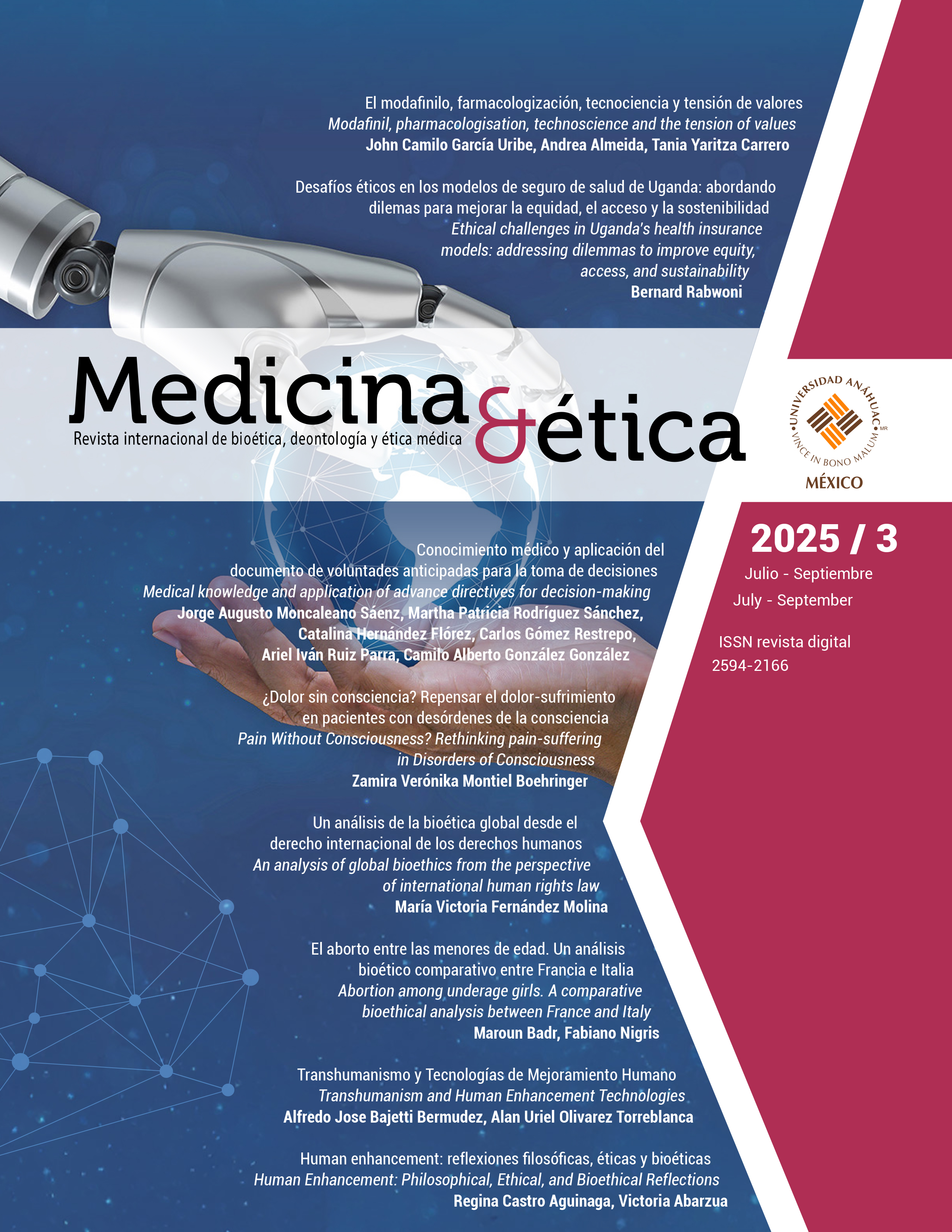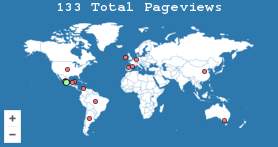Desafíos éticos en los modelos de seguro de salud de Uganda: abordando dilemas para mejorar la equidad, el acceso y la sostenibilidad
DOI:
https://doi.org/10.36105/mye.2025v36n3.02Palabras clave:
Sistema de salud de Uganda, seguro médico, ética, co- bertura universal de salud (CSU)Resumen
El sector de seguros de salud de Uganda sigue estando subdesarrollado, con baja cobertura y una fuerte dependencia de los pagos directos. Este documento explora los desafíos éticos de los modelos de seguros de salud de Uganda, centrándose en la equidad, el acceso y la sostenibilidad. Utilizando principios bioéticos, marcos de derechos humanos y la perspectiva moral Ubuntu, examina cuestiones como la asequibilidad, la exclusión de poblaciones vulnerables y la deficiente supervisión regulatoria. Las soluciones clave incluyen la implementación de un Sistema Nacional de Seguro de Salud (SNHS), el fortalecimiento de los seguros comunitarios, la mejora de la regulación, la garantía del compromiso político y el aumento de la transparencia y la rendición de cuentas. Basándose en la literatura existente y los análisis de políticas, este estudio destaca la urgente necesidad de reformas éticas y políticas para crear un sistema de seguros de salud inclusivo y sostenible. Abordar estos desafíos impulsará la cobertura sanitaria universal, mejorará los resultados de salud y contribuirá al desarrollo social y económico mediante un enfoque colaborativo y basado en la justicia.
Descargas
Referencias
1. World Health Organization. Health Systems Financing: The Path to Universal Coverage. Geneva: World Health Organization; 2010.
2. Van Hees SGM, O’Fallon T, Hofker M. Leaving no one behind? Social inclusion of health insurance in low and middle income countries: a systematic review [Internet]. Int J Equity Health. 2019; 18:134. Disponible en: https://doi.org/10.1186/s12939-019-1040-0 DOI: https://doi.org/10.1186/s12939-019-1040-0
3. Amnesty International. Building resilience: public debt management and health financing in Uganda [Internet]. 2023 [consultado 3 de enero de 2025]. Disponible en: https://www.amnesty.org/en/latest/campaigns/2023/09/building-resilience-public-debt-management-and-health-financing-in-ugand/?utm_source=chatgpt.com
4. Insurance Regulatory Authority of Uganda. An update on the National Health Insurance Scheme [Internet]. August 3, 2022. [consultado 26 de diciembre de 2024]. Disponible en: https://ira.go.ug/an-update-on-the-national-health-insuran-cescheme/
5. Kagan, J. What Is Health Insurance? Investopedia [Internet] 2024. [consultado 28 de diciembre de 2024]. Disponible en: https://www.investopedia.com/terms/h/healthinsurance.asp
6. Ssennyonjo A, Ekirapa–Kiracho E, Musila T, Ssengooba F. Fitting health financing reforms to context: examining the evolution of results-based financing models and the slow national scale-up in Uganda (2003-2015) [Internet]. Glob Health Action. 2021; 14(1). Disponible en: https://doi.org/10.1080/16549716.2021.1919393 DOI: https://doi.org/10.1080/16549716.2021.1919393
7. Barasa E, Kazungu JS, Ravishankar N. Examining the level and inequality in health insurance coverage in 36 Sub-Saharan African countries [Internet]. BMJ Glob Health. 2021; 6(4):e004712. Disponible en: https://doi.org/10.1136/bmj-gh-2020-004712 DOI: https://doi.org/10.1136/bmjgh-2020-004712
8. Natukunda C. The Health Insurance Bill in Uganda: Report on the civil society engagement towards the enactment of this important legislation. Africa Health [Internet]. 2022 [consultado 27 de diciembre de 2024]. Disponible en: https://africa-health.com/wp-content/uploads/2022/05/AH-2022-04-30-NHIS.pdf
9. O’Donnell O. Health and health system effects on poverty: A narrative review of global evidence [Internet]. Health Policy. 2024; 142:105018. Disponible en: https://doi.org/10.1016/j.healthpol.2024.105018 DOI: https://doi.org/10.1016/j.healthpol.2024.105018
10. Generis Global Legal Services. Comprehensive overview of insurance types in Uganda: Health, auto, property, and liability [Internet]. [consultado 5 de enero de 2025]. Disponible en: https://generisonline.com/comprehensive-overview-of-insurance-types-in-uganda-health-auto-property-and-liability/
11. Thomson S, Sagan A, Mossialos E, North J. Why private health insurance? Thomson S, Sagan A, Mossialos E, editores. Private Health Insurance: History, Politics and Performance. Cambridge: Cambridge University Press; 2020 [Internet] (Euro- pean Observatory on Health Systems and Policies). Disponible en: https://doi.org/10.1017/9781139026468.001 DOI: https://doi.org/10.1017/9781139026468.001
12. McIntyre D, McLeod H. The challenges of pursuing private health insurance in low and middle income countries: lessons from South Africa. Thomson S, Sagan A, Mossialos E, editores. Private Health Insurance. Cambridge: Cambridge University Press; 2020. Disponible en: https://doi.org/10.1017/9781139026468.012 DOI: https://doi.org/10.1017/9781139026468.012
13. Degroote S, Ridde V, De Allegri M. Health insurance in sub-Saharan Africa: a scoping review of the methods used to evaluate its impact [Internet]. Appl Health Econ Health Policy. 2020; 18:825–840. Disponible en: https://doi.org/10.1007/s40258-019-00499-y DOI: https://doi.org/10.1007/s40258-019-00499-y
14. Kakama AA, Namyalo PK, Basaza RK. Feasibility and desirability of scaling up Community–based Health Insurance (CBHI) in rural communities in Uganda: lessons from Kisiizi Hospital CBHI scheme [Internet]. BMC Health Serv Res. 2020; 20:662. Disponible en: https://doi.org/10.1186/s12913-020-05525-7 DOI: https://doi.org/10.1186/s12913-020-05525-7
15. Zepre K, Yassin F, Tadesse B, Tolossa O, Hailemariam D, Wondimu A, GebreE- yesus FA, Tsehay T, Assfa K. Factors influencing dropout of households from community-based health insurance membership in rural districts of Gurage Zone, Southern Ethiopia: Community based case-control study [Internet]. Front Public Health. 2022; 10:925309. Disponible en: https://doi.org/10.3389/fpubh.2022.925309 DOI: https://doi.org/10.3389/fpubh.2022.925309
16. Masereka EM, Alanyo LG, Ikiriza A, Andinda M, Akugizibwe P, Kimera E. Perspective chapter: Public health insurance in developing countries. Tavares AI, editor. Health Insurance Across Worldwide Health Systems [Internet]. 2024. Disponible en: https://doi.org/10.5772/intechopen.1003279 DOI: https://doi.org/10.5772/intechopen.1003279
17. Ssennyonjo A. National health insurance in Uganda: examining the proposed design and its implications for successful implementation. 2019 [Internet]. [consultado 26 de diciembre de 2024}. Disponible en: https://www.researchgate.net/publication/350193736_National_Health_Insurance_in_Uganda_Examining_the_Proposed_Design_and_its_Implications_for
18. Okidi G. Microinsurance for the underserved population: Challenges and opportunities [Internet]. FSD Uganda; 2024 [Consultado 29 de diciembre de 2024]. Disponible en: https://fsduganda.or.ug/microinsurance-for-the-underserved-population-challenges-and-opportunities/
19. Lindberg C, Nareeba T, Kajungu D. The extent of universal health coverage for maternal health services in Eastern Uganda: a cross-sectional study [Internet]. Matern Child Health J. 2022; 26(4):632-641. Disponible en: https://doi.org/10.1007/s10995-021-03357-3 DOI: https://doi.org/10.1007/s10995-021-03357-3
20. Rostampour M, Nosratnejad S. A systematic review of equity in healthcare finan cing in low and middle income countries [Internet]. Value Health Reg Issues. 2020; 21:133–140. Disponible en: https://doi.org/10.1016/j.vhri.2019.10.001 DOI: https://doi.org/10.1016/j.vhri.2019.10.001
21. Parbery-Clark C, McSweeney L, Lally J. How can health systems approach reducing health inequalities? An in-depth qualitative case study in the UK [Internet]. BMC Public Health. 2024; 24:2168. Disponible en: https://doi.org/10.1186/s12889-024-19531-5 DOI: https://doi.org/10.1186/s12889-024-19531-5
22. Oehring D, Gunasekera P. Ethical frameworks and global health: A narrative re- view of the “Leave no one behind” principle [Internet]. INQUIRY. 2024; 61. Disponible en: https://doi.org/10.1177/00469580241288346 DOI: https://doi.org/10.1177/00469580241288346
23. Beauchamp T, Childress J. Principles of biomedical ethics: marking its fortieth anniversary [Internet]. Am J Bioeth. 2019; 19(11):9–12. Disponible en: https://doi.org/10.1080/15265161.2019.1665402 DOI: https://doi.org/10.1080/15265161.2019.1665402
24. Gille F, Smith S, Mays N. What is public trust in the healthcare system? A new conceptual framework developed from qualitative data in England [Internet]. Soc Theory Health. 2021; 19:1–20. Disponible en: https://doi.org/10.1057/s41285-020-00129-x DOI: https://doi.org/10.1057/s41285-020-00129-x
25. Otieno E, Namyalo J. The paradox of the Ugandan health insurance system: challenges and opportunities for health reform [Internet]. J Prev Med Public Health. 2023; 23(110):38228135. Disponible en: https://doi.org/10.3961/jpmph.23.110 DOI: https://doi.org/10.3961/jpmph.23.110
26. Ly MS, Bassoum O, Faye A. Universal health insurance in Africa: a narrative review of the literature on institutional models [Internet]. BMJ Global Health. 2022; 7:e008219. Disponible en: https://doi.org/10.1136/bmjgh-2021-008219 DOI: https://doi.org/10.1136/bmjgh-2021-008219
27. United Nations. Universal values: principle one: human rights-based approach [Internet]. [Consultado 29 de diciembre de 2024]. Disponible en: https://unsdg.un.org/2030-agenda/universal-values/human-rights-based-approach
28. United Nations, The Human Rights-Based Approach to Development Cooperation: Towards a Common Understanding [Internet]. [consultado 29 de diciembre de 2024]. Disponible en: https://unsdg.un.org/sites/default/files/6959-%20The_Human_Rights_Based_Approach_to_Development_Cooperation_Towards_a_Common_Understanding
29. Abbasi M, Majdzadeh R, Zali A, Akrami F. The evolution of public health ethics frameworks: systematic review of moral values and norms in public health policy [Internet]. Med Health Care Philos. 2018; 21:387–402. Disponible en: https://doi.org/10.1007/s11019-017-9813-y DOI: https://doi.org/10.1007/s11019-017-9813-y
30. Prentice AN, Adams R, Porterfield DS, Daaleman TP. Population health. In: Daaleman TP, Helton MR, editores. Chronic illness care [Internet]. Cham: Springer; 2023. Disponible en: https://doi.org/10.1007/978-3-031-29171-5_35 DOI: https://doi.org/10.1007/978-3-031-29171-5_35
31. Mbiti JS, African traditional religions and philosophy. New York: Doubleday; 1971.
32. Noussia K. Comparative analysis of transparency in insurance regulation and supervisory law of the countries outside the EU and Europe (rest of world). In: Marano P, Noussia K, editores. Transparency in insurance regulation and supervisory law [Internet]. Cham: Springer; 2021. (AIDA Europe Research Series on Insurance Law and Regulation; vol 4). Disponible en: https://doi.org/10.1007/978-3-030-63621-0_26 DOI: https://doi.org/10.1007/978-3-030-63621-0_26
33. Ssempala R. Factors influencing demand for health insurance in Uganda [Inter- net]. SSRN Electron J. January 2018. Disponible en: https://doi.org/10.2139/ssrn.3124179 DOI: https://doi.org/10.2139/ssrn.3124179
34. Al-Worafi YM. Health literacy and diseases prevention. Al-Worafi YM, editor. Handbook of medical and health sciences in developing countries [Internet]. Cham: Springer; 2024. Disponible en: https://doi.org/10.1007/978-3-030-74786-2_281-1 DOI: https://doi.org/10.1007/978-3-030-74786-2_281-1
35. Behera DK, Rahut DB, Haridas HT. Public versus private health financing transition in low and middle income countries: exploring the crowding-out effects [Inter- net]. Eur J Dev Res. 2024; 36:957–986. Disponible en: https://doi.org/10.1057/s41287-023-00618-5 DOI: https://doi.org/10.1057/s41287-023-00618-5

Descargas
Publicado
Número
Sección
Licencia
Derechos de autor 2025 Bernard Rabwoni

Esta obra está bajo una licencia internacional Creative Commons Atribución-NoComercial-CompartirIgual 4.0.
Medicina y Ética se distribuye bajo Licencia Creative Commons Atribución-NoComercial-CompartirIgual 4.0 Internacional.
El autor conserva los derechos patrimoniales sin restricciones y garantiza a la revista el derecho de ser la primera publicación del trabajo. El autor es libre de depositar la versión publicada en cualquier otro medio, como un repositorio institucional o en su propio sitio web.

































